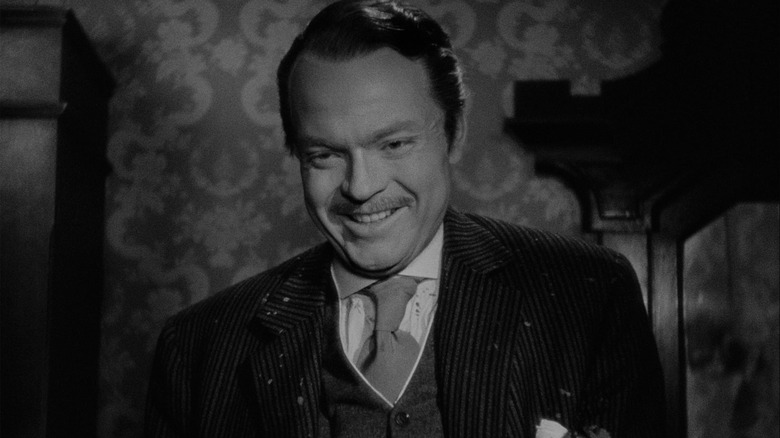Citizen Kane's Real-Life Inspiration Had A Different Theory On The Classic Rosebud Moment
More essays have been written about "Citizen Kane" than any other movie (with the possible exceptions of "The Wizard of Oz" and "Star Wars"), so it feels churlish to recount the plot here, but for the uninitiated, however, here's a brief rundown:
A vicious newspaper tycoon named Charles Foster Kane (Welles) has died in bed, locked deep in his massive, palatial mansion. He clutched a snow globe in his hand in his final moments, moved by the sight of the swirling faux weather inside. He enigmatically whispers the word "Rosebud" before perishing. The film then shifts focus to a reporter (William Alland) who spends the film interviewing Kane's associates, wives, and lovers, hoping to get a full portrait of the man. He finds that Kane was a cad ruined by wealth and power. He finds that Kane was possessed of a deep and abiding unhappiness, likely spurred by having to leave his mother as a child. One of the final shots of the film is a furnace in the deceased Kane mansion Xanadu, filled with old junk Kane forgot about. Burning into ash is a sled with the word "Rosebud" stenciled on it. His childhood sled. Kane just longed for the comfort of a childhood toy. He was that simple a man.
Kane has long been acknowledged as a stand-in for real-life newspaper tycoon William Randolph Hearst, and the real-life meaning of "Rosebud" was a cheeky, x-rated joke about an aspect of Hearst's personal life (explained below). Back in 2017, however, William Randolph Hearst III, the current CEO of Hearst Corp., was asked about his take on Welles' lampoon of his grandfather at the 2017 San Francisco Film Festival, and Hearst III had a wild theory. Rosebud was not the sled ... but the snow globe.
But ... Rosebud is the sled
Hearst was massively rich and widely reviled in his day. He infamously manipulated facts to sell papers and promoted racist narratives news throughout his tenure. He was largely responsible for the banning of cannabis in the United States because the hemp-based paper industry threatened his livelihood. He faked interviews, made up stories, and is probably the reason you know the term "yellow journalism." Hearst was married to a chorus girl named Millicent Willson but also had an open affair with actress Marion Davies for many years. The "Rosebud" reference in "Citizen Kane" is based on a rumor that Hearst used the word to describe Davies' genitals.
Orson Welles' presented Hearst/Kane as a shallow a-hole who turned to wealth and corruption when the comforts of a rustic childhood were stolen from him. In Welles' own words: "In [Kane's] subconscious, [Rosebud] represented the simplicity, the comfort, above all the lack of responsibility in his home, and also it stood for his mother's love, which Kane never lost." Kane became a stand-in for all of America's wealthiest citizens in perpetuity; when someone flaunts their wealth, the public now begins to ponder how they might be deeply damaged.
Hearst III has a different read. At a post-screening Q&A at the San Francisco Film Festival, he said:
"Many people think Rosebud is the sled. [...] But I think Rosebud is actually that little snow globe. I think there is something sad in the character Kane, and to some degree in my grandfather's personality, that inside that little world, it's youth, it's childhood, it's home. It's safe, and they'd like to go back to that. I think that's what Rosebud is. It's really that sense of a childhood denied, in some way."
Which is, one might argue, kind of the same thing.
The rich don't understand criticism of the rich
Hearst III noted that his grandfather retained his childhood late into his life, drawing a direct parallel between Kane's personal crisis and Hearst's own personality. Interviewer David Thompson then asked Hearst III about the Marion Davies connection, pointing out that celebrated intellect Gore Vidal broke the news when Hearst died. Hearst III could only say "That sounds like Gore Vidal."
Hearst III made no comment, however, on how it might be the massive wealth hoarded by Kane that was the source of his corruption, emptiness, and unhappiness. Hearst III doesn't misinterpret Kane, but he doesn't acknowledge how acidic Welles' film was to America's wealthy. Ambitious, rich media tycoons, the film declares openly, are callow a-holes. This plays itself out in the modern day as well. One might recall the 2002 interviews documentarian Errol Morris conducted with various celebrities about their favorite movies. He managed to get Donald Trump — an unremarkable media personality from the 1980s — to talk about "Citizen Kane."
Trump did note that Kane experienced a massive financial rise but then experienced a personal fall. He blithered for a few moments about how "Rosebud" was a poetic word that everyone loved before Morris asked him what advice he would give to Kane. Trump recommended Kane marry a different woman. For Trump, Kane's wealth wasn't the source of his unhappiness, nor necessarily his lost childhood. It was, instead, a nagging wife. That seems to be a pretty terrible interpretation, as Welles makes it clear that Kane's relationships fall apart as a result of his dark-eyed ambition and not the other way around.
These days, Trump is on trial for multiple acts of criminal malfeasance. One might be tempted to ask what his "Rosebud" might be.


